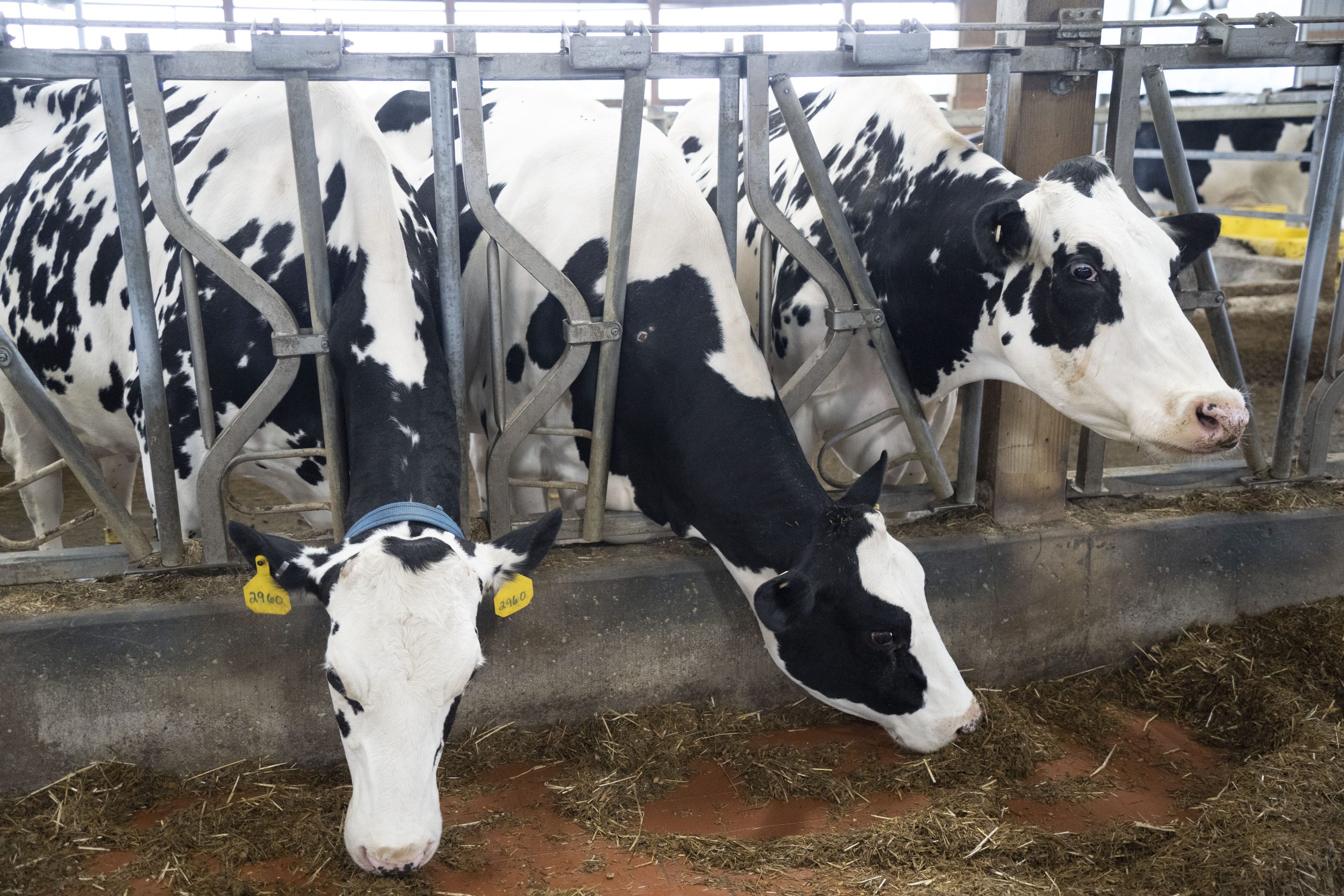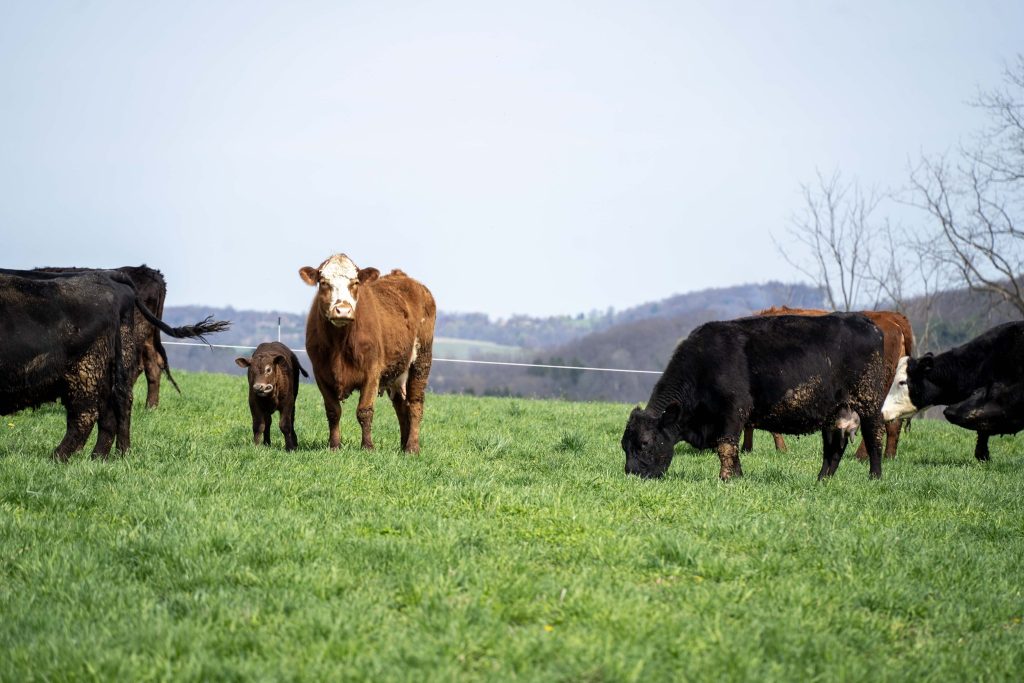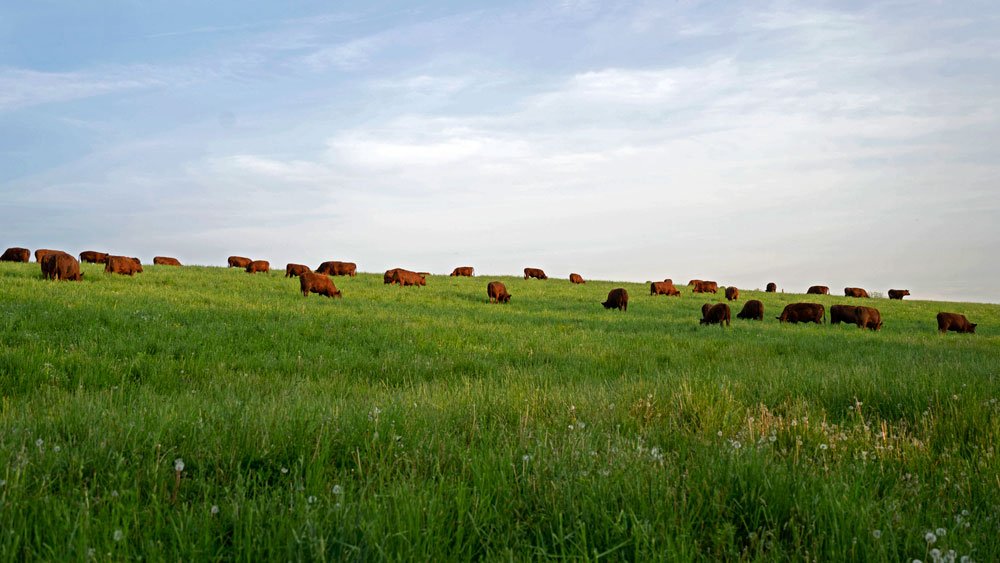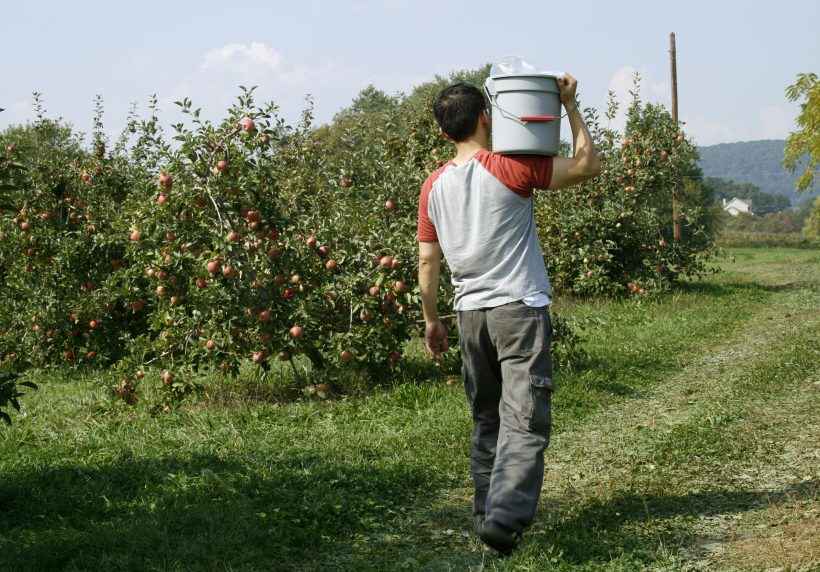USDA Order to Require Influenza A Testing for Lactating Dairy Cattle
To further protect the U.S. livestock industry from the threat posed by Influenza A, USDA is sharing a number of actions it is taking to help get ahead of the disease and limit its spread.
USDA’s Animal and Plant Health Inspection Service (APHIS) announced a Federal Order requiring the following measures, effective Monday, April 29, 2024:
Mandatory Testing for Interstate Movement of Dairy Cattle
- Prior to interstate movement, dairy cattle are required to receive a negative test for Influenza A virus at an approved National Animal Health Laboratory Network (NAHLN) laboratory.
- Owners of herds in which dairy cattle test positive for interstate movement will be required to provide epidemiological information, including animal movement tracing.
- Dairy cattle moving interstate must adhere to conditions specified by APHIS.
- As will be described in forthcoming guidance, these steps will be immediately required for lactating dairy cattle, while these requirements for other classes of dairy cattle will be based on scientific factors concerning the virus and its evolving risk profile.
Mandatory Reporting
- Laboratories and state veterinarians must report positive Influenza A nucleic acid detection diagnostic results (e.g. PCR or genetic sequencing) in livestock to USDA APHIS.
- Laboratories and state veterinarians must report positive Influenza A serology diagnostic results in livestock to USDA APHIS.
Testing Guidance for Labs for Influenza A in Livestock
PDA Issues Quarantine Order on April 11th for HPAI A Positive Dairy Cattle
On April 11, The Pennsylvania Department of Agriculture’s Bureau of Animal Health and Diagnostic Services released a notice that outlines requirements if a Pennsylvania dairy farm would be quarantined upon suspicion/confirmation of a case of highly pathogenic avian influenza in cattle. The notice encourages the implementation of farm biosecurity practices as well as the development of a written everyday (FARM Program) and enhanced biosecurity plans. In the event that the Bureau of Animal Health and Diagnostic Services issues an Order of Special Quarantine for HPAI in dairy cattle, movement of lactating animals on or off the premises will be restricted.
According to the notice, movement of milk from healthy cattle on a quarantined premises to a milk processor for pasteurization will be allowable under permit issued by the Bureau of Animal Health and Diagnostic Services in 30-day increments.
To read PDA’s quarantine notice issued on April 11th, click here.
PDA Issues Movement Restrictions on April 5th for Out of State Dairy Cattle Affected by Bovine HPAI
Farm Bureau is monitoring developments regarding the detection of highly pathogenic avian influenza (HPAI) in dairy cattle in herds located in several western and midwestern states that began in late March. In an abundance of caution, the Pennsylvania Department of Agriculture (PDA) announced a quarantine order that requires HPAI testing for any dairy cows coming in from another state, applying to all dairy breeds and crosses, with the only exception being animals going directly to slaughter.
PDA’s order requires the following:
- Dairy cattle from a state where avian influenza has been confirmed in dairy cattle in the past 30 days may not be imported to, stopped off in or unloaded in Pennsylvania without testing of nasal swabs and milk.
- At least 30 animals, or all animals in loads with fewer than 30, must be tested within five days before movement.
- The animals must have been assembled as a group for at least 30 days with no new animals added in the 30 days before testing; otherwise, all animals must be tested.
- Testing is not required for calves under 1 year old, and for cattle moving directly to slaughter that are not commingled with cattle not moving to slaughter.
- Cattle from an infected farm may not be brought into Pennsylvania until the site tests negative.
To read the entire order released by PDA on Friday, April 5, click here.
APHIS is providing regular updates on detections in dairy herds.
PDA urges all dairy producers to update their biosecurity plans and be wary of wild birds (primarily waterfowl) that continue to be the main spreaders of HPAI, and there is evidence that suggests that the virus can be transmitted from cow to cow, as well as from bird to cow. Three quarantines of poultry and non-poultry premises previously imposed by PDA remain in effect but are expected to be lifted within the next month.
The PA Center for Dairy Excellence will be holding weekly calls with producers to provide updates on the situation. Visit this link for information on how to join those calls: Weekly Dairy Industry Conference Calls: Updates on HPAI Health Situation and PA’s Response | Center for Dairy Excellence.
USDA, FDA and CDC Share Updates on HPAI Detections in Dairy Cattle
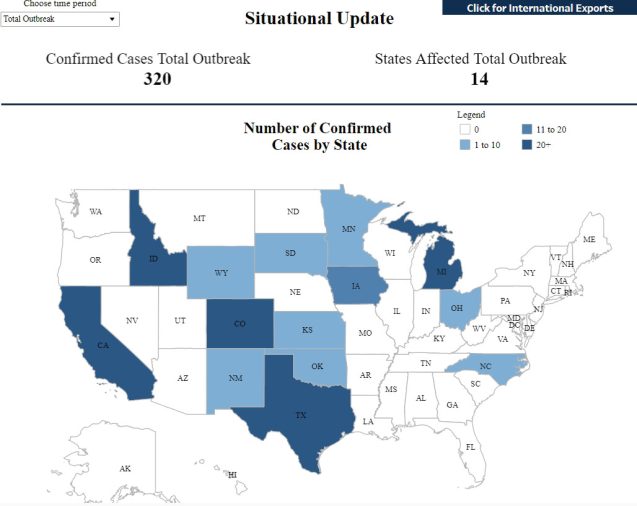
Highly Pathogenic Avian Influenza (HPAI) has been detected in multiple states, according to USDA APHIS data. The number of cases is ever changing and the APHIS page, which monitors cases of HPAI across the country are updated daily at 4 p.m. by USDA APHIS. A link to the APHIS page with up-to-date information can be found in the resources section at the bottom of this page.
The strain appears to have been introduced by wild birds, according to USDA.
No Concern for Consumer Safety with U.S. Milk Supply
There continues to be no concern about the safety of the commercial milk supply because products are pasteurized before entering the market. Dairies are required to send only milk from healthy animals into processing for human consumption. Milk from impacted animals is being diverted or destroyed so that it does not enter the human food supply. In addition, pasteurization has continually proven to inactivate bacteria and viruses, like influenza, in milk. Pasteurization is required for any milk entering interstate commerce for human consumption. FDA’s longstanding position is that unpasteurized, raw milk can harbor dangerous microorganisms that can pose serious health risks to consumers. The FDA is reminding consumers of the risks associated with raw milk consumption in light of the HPAI detections.
Protecting Your Herd
Biosecurity protocols are critical to preventing and managing HPAI on dairy farms. According to the latest federal update, the spread of symptoms among the Michigan herd indicates that HPAI transmission between cattle cannot be ruled out. USDA and partners have advised veterinarians and producers to adhere to the following:
- When introducing new animals to the dairy, isolate them for two weeks and monitor their health before mixing them with the existing herd
- Employees who handle cattle should be aware of clinical signs to help monitor the disease
- Milk and care for sick animals last, disinfect all handling and care equipment afterward
- Prior to shipping cattle to your farm, know the health history of the herds from which cattle are purchased
- All cattle shipped across state lines must have official interstate certificate of veterinary inspection (CVI) filled out by a United States Department of Agriculture (USDA) accredited veterinarian
- Trucks and trailers transporting cattle should be cleaned and disinfected. Implement disinfection protocols on all farm and transport equipment
- Implement a rodent/pest control program
- Minimize the interaction with wild birds by incorporating management practices for wildlife
- Try to reduce the flow of people between farm sites and the commingling of people from multiple production sites in common places
- If employees move between sites, change or disinfect footwear, (clothing, if possible) and wash hands
- Control traffic onto and around your farm operation, only vehicles/equipment/people essential to operation should be traveling into animal areas
- This includes limiting people’s access to cattle pens, feed mixing/storage areas, feed bunks and cattle treatment areas
- Maintain a visitor log for all farm locations, collect visitor contact information such as Employees, Visitors, Non-farm employed service providers: hoof-trimmers, nutritionists, breeding technicians, etc.
- Non-farm service providers should park in a designated location and practice biosecurity practices such as wearing single use, single farm washable clothing, disposable footwear, or completely disinfecting their footwear and animal handling equipment.
- Frequent handwashing is advised
- If composting, dead animal management should be the last task of the day
- If rendering, locate the dead animal pick-up away from all animal spaces and facilities
- Be aware that wet weather conditions have the potential to increase pathogen transfer
Signs of HPAI in Cattle
- Reduced feed intake
- decreased rumen motility
- reduced milk production
- abnormal, tacky or loose manure
- low-grade fever
- Milk from infected cows appears as thicker, concentrated, colostrum-like milk that may be discolored (yellow to brown)
How to Handle Sick Cattle
- Isolate, segregate and reduce points of direct contact between well and sick animals
- Notify your herd veterinarian to decide if proceeding with sampling and confirmatory testing
- Reduce human exposure to animals suspected of being sick
- Wear eye covering, masks and gloves when working with suspected sick animals to reduce contraction of disease through airborne particles
- Avoid contact between hands and face, especially the eyes and mouth, while working with suspected or confirmed sick animals
- Avoid touching your mouth, nose or eyes after contact with suspected or confirmed sick cattle and surfaces that may be contaminated with saliva, mucous or manure
- Change your clothes before contact with healthy cows. Throw away gloves, facemask and wash your hands with soap and water
Impact on Cattle
Common clinical signs in affected cows have been reduced milk production and low appetite, according to AVMA. Affected animals have recovered after isolation with little to no associated mortality reported, according to USDA. Veterinarians and producers are urged to practice good biosecurity, minimize animal movements, test animals before movements and isolate sick cattle.
Employee Biosecurity and Prevention Measures:
- Do not drink raw milk
- Have dedicated footwear for the farm
- All staff leave boots and footwear used on the farm in a location indicated by the farm for safe storage
- All footwear used on the farm must be cleaned and disinfected, including sides and bottoms, prior to storing them
- Wear clean clothes & shoes to the farm
- If you come into contact with other livestock, clothing and footwear should be changed before coming to the farm
- Practice good hygiene, wash hands frequently
- Influenza viruses are highly sensitive to soap and hot water.
- Do not eat around animals or in the barn
- Limit entry to the farm for people and workers
- Visitors entering the farm should wear clean or disposable clothing and footwear
- Maintain a visitor log for all farm locations, collect visitor contact information
Monitor employees for potential symptoms of HPAI:
- Fever (Temperature of 100°F [37.8°C] or greater) or feeling feverish/chills
- Cough
- Sore throat
- Difficulty breathing/Shortness of breath
- Eye tearing, redness or irritation
- Headaches
- Runny or stuffy nose
- Muscle or body aches
- Diarrhea
Center for Dairy Excellence Offering Biosecurity Kits
To help dairy producers prioritize biosecurity on their operations, the Center for Dairy Excellence is partnering with Penn State Extension to offer “Everyday Biosecurity Kits†to dairy farms at no cost. The kits include a compilation of printed biosecurity resources from across the industry, including the National Dairy FARM Program, Penn State Extension, and the SMS Secure Milk Supply.
Each kit will include:
- A biosecurity “No Trespassing†sign (with both English and Spanish) to display on your farm
- Laminated copies of biosecurity signage/documents
- A visitor sign-in log sheet
- A short guide for what to include in your own biosecurity kit
- Additional printed resources
Center for Dairy Excellence Hosting Weekly HPAI Update Calls
The Center for Dairy Excellence hosted a Dairy Industry Conference Call on Wednesday, April 3 to provide updates on the rapidly evolving health situation with highly pathogenic avian influenza (HPAI) affecting dairy cattle and Pennsylvania’s response. The conference call recording is now available, and the Center has scheduled weekly conference calls going forward on Wednesdays at 1 p.m. EST to share regular updates.
Visit www.centerfordairyexcellence.org/hpai-industry-call to access the recording and learn more about upcoming conference calls. To join next week’s call on Wednesday, April 10, view the following connection details:
Dial +1 301-715-8592
Enter Meeting ID: 813 6659 8116
Enter Passcode: 162069
Or join the call via Zoom: https://us02web.zoom.us/j/81366598116?pwd=YXdVTHhsU2RlS2xXQitNZTQ2V1hxUT09
Resources





